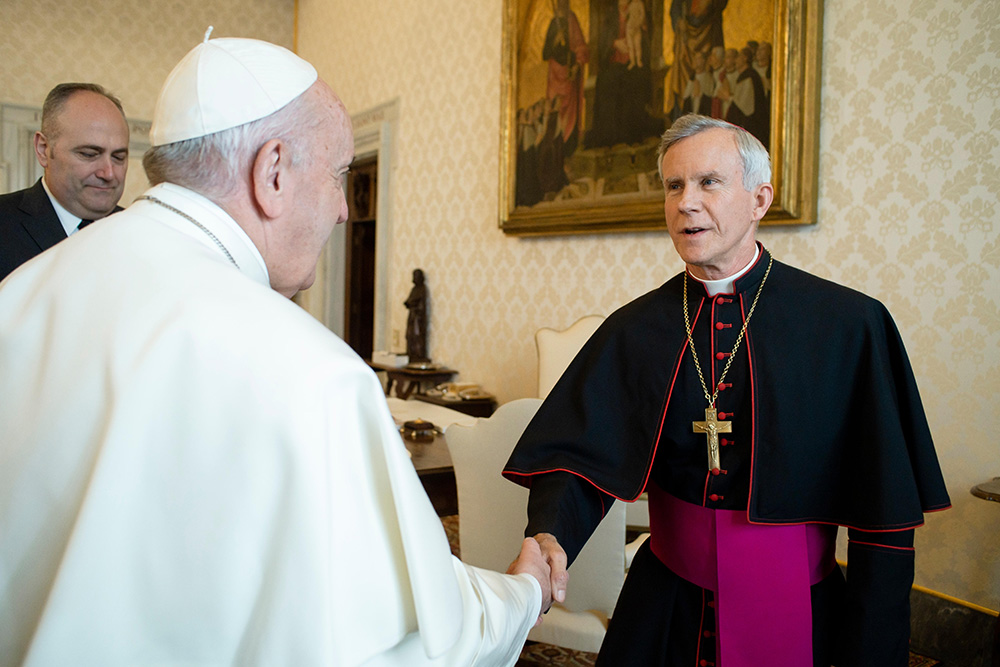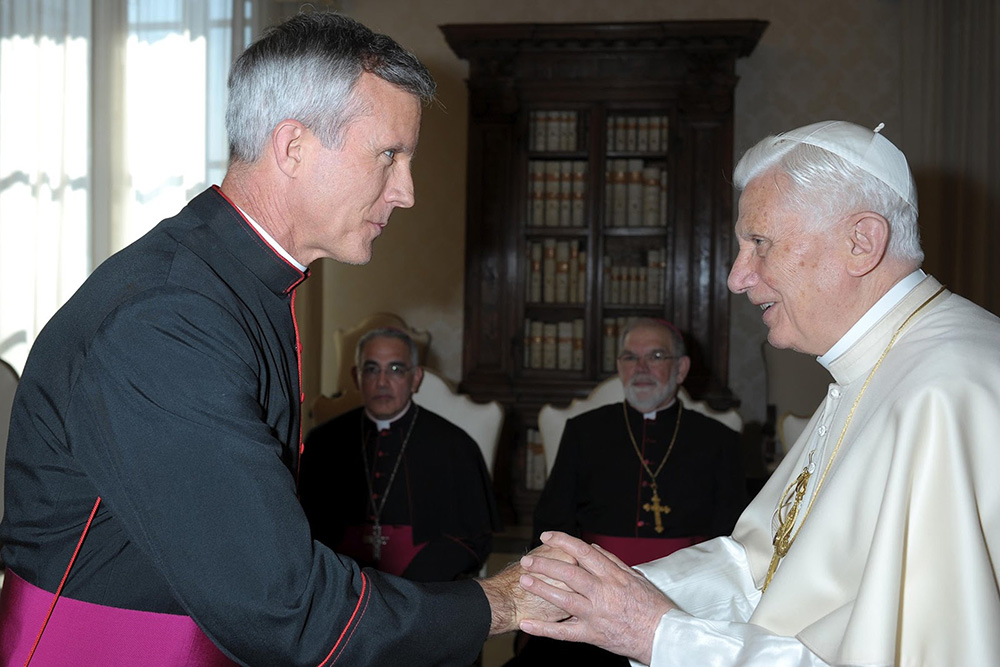
Pope Francis greets Bishop Joseph Strickland of Tyler, Texas, during a meeting with U.S. bishops from Arkansas, Oklahoma and Texas during their "ad limina" visits to the Vatican Jan. 20, 2020. (CNS/Vatican Media)
Firebrand Texas Bishop Joseph Strickland, who has been subject to a Vatican investigation over his leadership style and right-wing comments on social media, has vowed in recent days not to resign or "voluntarily abandon" his diocese, even if Pope Francis asks him to do so.
But the Catholic Church's Code of Canon Law leaves Strickland little to no room to resist if the pontiff demands his resignation, several prominent canon lawyers told NCR.
Canon law makes it clear that the pope has "supreme, full, immediate, and universal ordinary power" in the Catholic Church, and that any final decree he issues is binding and cannot be appealed. That authority applies in cases where the pontiff decides to remove a sitting diocesan bishop, said the canonists.
"If you look at the canons on the authority of the pope, the pope has full supreme power over the church. He also has the authority to act within dioceses. The Roman pontiff has power over all particular churches," Nicholas Cafardi, a civil and canon lawyer, told NCR.
Strickland, himself a canon lawyer who leads the Tyler Diocese, told Religion News Service on Sept. 12 that he would not willingly give up his diocesan post if Francis demands his resignation, which has been the subject of recent rumors in Texas and Rome.
Francis held a meeting on Sept. 9 with Archbishop Christophe Pierre, the Vatican's ambassador to the United States, and Archbishop Robert Francis Prevost, the prefect of the Vatican's Dicastery of the Bishops, at which they may have discussed Strickland's case.
Strickland told RNS that the Vatican had not asked him to resign, but he also signaled that he would resist any such request by declaring that "as a basic principle," he could not surrender the "mandate given" to him by Pope Benedict XVI. The late pope appointed Strickland the bishop of Tyler in 2012.
"Of course that mandate can be rescinded by Pope Francis, but I cannot voluntarily abandon the flock that I have been given charge of as a successor of the apostles," Strickland told RNS.

Then-Msgr. Joseph Strickland greets Pope Benedict XVI at the Vatican in March 2012. Benedict appointed Strickland bishop of Tyler, Texas, later that year. (CNS/L'Osservatore Romano)
In Catholic theological and canonical matters, a bishop is indeed understood as one "succeeding to the place of the Apostles," who possesses teaching and governing authority in his own right. Bishops, Cafardi said, are not akin to midlevel corporate branch managers.
"Bishops are successors of the apostles. That can't be taken away from them," said Cafardi, who suggested that Strickland appeared to be making more of a theological statement than staking out a canonical position in his comments to RNS.
While articulating a bishop's exalted status in the Catholic Church, canon law also stipulates that a bishop's authority to exercise his ministry and govern "can only be exercised in hierarchical communion with the head and members of the college" of bishops.
Canons 330-333 emphasize the pope's primacy in all ecclesial matters, including over local churches. The pope's primacy, canon law says, "strengthens and protects the proper, ordinary, and immediate power which bishops possess in the particular churches entrusted to their care."
In addition, Francis issued a two-page decree in November 2014 pertaining to situations where bishops and Vatican officials renounce their offices. Article 5 in that decree stipulates that "in some circumstances, the competent Authority can decide that it is necessary to ask a bishop to present his resignation from pastoral office."
In such a situation, the decree says that the bishop is to be informed of the reasons for the request and that his concerns be listened to "attentively," in "a fraternal dialogue."
"We've certainly seen bishops who raise questions, but they tend to be cautious and prudent. This kind of grandstanding with Bishop Strickland, this is something new," said Charles Reid Jr., a canon lawyer and law professor at the University of St. Thomas in St. Paul, Minnesota.
In recent years, Strickland has strained his ties with Francis and other bishops. Posting on X (formerly known as Twitter), Strickland has accused the present pope of "undermining the Deposit of Faith," and has shared several videos and essays attacking Francis.
Strickland has publicly defended priests disciplined by other bishops. He has also insinuated on X that certain Vatican officials have left the Catholic faith, specifically naming Cardinal Arthur Roche, the prefect for the Dicastery for Divine Worship and the Discipline of the Sacraments, and Archbishop Víctor Manuel Fernández, the new prefect for the Dicastery of the Doctrine of the Faith.
Advertisement
Strickland's leadership of his East Texas diocese is currently the subject of a Vatican investigation, known formally as an apostolic visitation. As part of that investigation, two bishops interviewed several witnesses over the course of several days in June.
A priest in the Tyler Diocese who was interviewed for the visitation told NCR that the bishops focused their inquiry on Strickland's management of the diocese, including one question on what he believed Strickland understood "Deposit of Faith" to mean. The priest spoke to NCR on the condition of anonymity, for fear of retribution.
Said Cafardi: "You don't ask someone to resign after an apostolic visitation unless something comes up."
Strickland's removal would not be without recent precedent. Since becoming pope in March 2013, Francis has removed other bishops, including at least two who refused to resign when they were asked to do so.
In March 2022, Francis "relieved" Bishop Daniel Fernández Torres from the pastoral care of the Diocese of Arecibo, Puerto Rico. Fernández's ouster followed a period where he publicly clashed with other Puerto Rican bishops on matters pertaining to COVID-19 vaccines and his opposition to a bill that would have banned so-called conversion therapy for LGBTQ people.
Fernández said he refused a Vatican request for his resignation, and said in a statement posted on the diocesan website that he felt "blessed to suffer persecution and slander for proclaiming the truth."
In September 2013, Francis removed Paraguayan bishop Rogelio Livieres Plano due to what the Vatican called "serious pastoral concerns" in an effort to preserve "the unity of both the bishops and the faithful."
Livieres also refused the Vatican's request to resign, and claimed in a posted statement that he had been a victim of ideological persecution by more liberal Catholics, The New York Times reported when Livieres died in 2015. Livieres later sought to reconcile by expressing his "full communion" with Rome.
"The pope has full authority to remove a bishop. That's just a fact," said Robert Flummerfelt, a Las Vegas-based canon lawyer who told NCR that it is a "very extreme action to defy the Holy Father."
"At the end of the day," Flummerfelt said, "I think [Strickland] should operate as a bishop of the Catholic Church in full communion with its visible head, its visible source of unity, the Holy Father, and should honor the Holy Father's request in this regard or try to find some way to resolve this."








